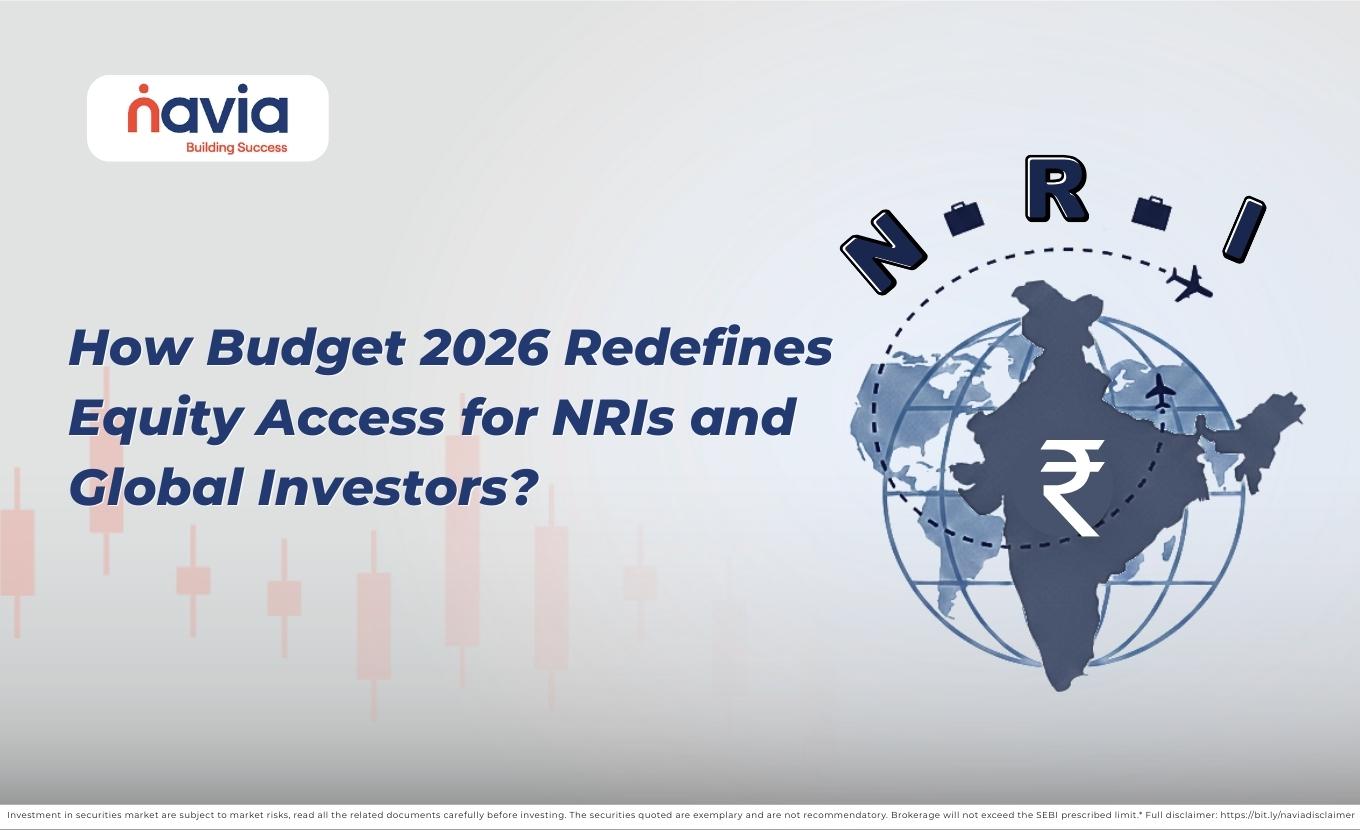Simplifying NRI Repatriation of Funds – A Comprehensive Guide

Introduction
For Non-Resident Indians (NRIs) and Foreign Nationals investing in Indian markets, understanding the process of fund repatriation is crucial. Navigating this process involves adherence to regulatory norms, tax requirements, and submission of precise documentation. This guide provides a detailed walkthrough for NRIs on repatriating funds, filing income tax, and understanding the documentation required, with insights on how Navia’s services can simplify every step.
Repatriating Funds from an NRO Account: How It Works
Non-Resident Ordinary (NRO) accounts are designed for NRIs to manage income earned in India, such as rent, dividends, or salary. One key feature of an NRO account is the ability to repatriate funds back to the NRI’s country of residence. Here’s how it’s done:
● Annual Limit: NRIs can repatriate up to USD 1 million per financial year from their NRO account. This includes any accrued income like rental income, dividend payouts, or pension.
● Documentation Requirements:
→ Auditor’s Certificate (15CA/15CB): The remittance process requires a certification from a Chartered Accountant (CA) attesting to the source of funds. This ensures that all taxes have been paid before repatriation.
→ Repatriation Request Form: This form needs to be submitted to the NRI’s bank in India to initiate the remittance.
● How Navia Can Help: Navia collaborates with certified auditors who can assist NRIs in obtaining the Auditor’s Certificate and preparing the remittance form. With Navia, this process is streamlined to ensure a hassle-free experience, taking the complexity out of documentation.
Importance of Filing Income Tax Returns (ITR) for NRIs
Filing Income Tax Returns (ITR) is an essential step for NRIs, as it ensures compliance and simplifies fund repatriation. NRIs with income in India, including income from capital gains, real estate, or interest on deposits, are required to file returns under Indian tax law.
Benefits of Filing Income Tax Returns:
1. Peace of Mind: Compliance with tax regulations reduces potential legal challenges and gives NRIs peace of mind.
2. Tax Refunds: If excess tax has been deducted at source (TDS), NRIs can claim a refund when they file their returns.
3. Loss Carry Forward: By filing returns, NRIs can carry forward losses for up to 8 years, which can offset future taxable income.
4. Financial Documentation: A filed return serves as a financial record that can support future investments or loan applications.
5. Avoiding Penalties: Filing on time avoids penalties, which may otherwise be levied for non-compliance.
6. Facilitating Visa Applications: Many embassies ask for proof of tax returns for visa approvals, making ITRs an essential document for frequent travelers.
7. Simplified Fund Repatriation: Filed returns provide a strong basis for remitting funds abroad, as they confirm the NRI’s tax obligations are met.
Options for Filing Income Tax Returns with Navia:
1. Do-It-Yourself: NRIs comfortable with the process can calculate and file returns independently.
2. File with an Auditor’s Help: NRIs can choose to engage an auditor for accurate and timely filing.
3. Navia’s Assisted Tax Filing Services: Navia offers a hassle-free option where experienced professionals handle everything from document preparation to filing. Once filed, NRIs only need to e-verify the return.
Repatriation of Funds for Foreign Nationals
Foreign nationals who invest in Indian stocks, often through Employee Stock Ownership Plans (ESOPs), can repatriate funds upon sale of shares. With a demat and trading account, this process is straightforward with the right documentation. Here’s a step-by-step breakdown:
1. Provide Purchase Details: Submit details of the stocks allotted through ESOPs, which will form the basis of the repatriation.
2. Documentation Requirements:
→ FCGPR/FCTRS: For regulatory compliance, submit either the FCGPR (Foreign Currency Gross Provisional Return) or FCTRS (Foreign Currency Transfer Return Scheme) issued by the Reserve Bank of India (RBI).
3. Bank Information: Specify the foreign bank details where the funds will be transferred, ensuring the funds reach the intended account.
4. Sell Stocks in the Market: Execute the sale of stocks on the Indian market as per applicable rules.
5. Inform Navia: Notify Navia of the repatriation request, allowing them to facilitate the next steps.
6. Submit Non-Resident Declaration: Provide a Non-Resident Declaration according to RBI’s guidelines, which is a requirement for all foreign investors.
7. Contract Note: Navia will generate a contract note detailing the sale transaction, essential for repatriation processing.
8. Obtain Auditor’s Certificate: Navia’s team can assist with arranging an Auditor’s Certificate, which is mandatory to confirm tax compliance for repatriation.
9. Submit Documents to the Bank: Navia’s partner, Tradeplus, will submit all required documents to the bank, expediting the transfer.
Service Charges for Repatriation Process
To ensure a seamless experience, repatriating funds from India involves a few service charges, which cover documentation, bank processing, and late fees if applicable:
● Auditor Fee: ₹6,000 + GST (subject to change based on market rates).
● Navia Service Fee: Navia charges 0.70% as a service fee for handling documentation and compliance.
● Bank Service Charges: These are standard charges levied by the bank handling the transfer.
Why Choose Navia for NRI Repatriation and Tax Services?
Navia’s comprehensive support simplifies the entire repatriation process, offering peace of mind to NRIs and Foreign Nationals alike. Here’s why Navia is an ideal partner:
● End-to-End Service: From obtaining an Auditor’s Certificate to document submission, Navia provides complete support.
● Experienced Professionals: With in-depth knowledge of regulatory requirements, Navia ensures every detail is handled accurately.
● Streamlined Compliance: Navia’s partnership with Tradeplus ensures that document submission and bank coordination are smooth and efficient.
● Transparency in Fees: Navia offers a transparent fee structure, allowing NRIs to understand the costs involved upfront.
● Trusted by Thousands: Navia has built a reputation for reliability, trust, and efficiency among NRIs.
Conclusion
Repatriating funds from India doesn’t have to be complex. By understanding the requirements and partnering with a reliable service provider like Navia, NRIs and Foreign Nationals can ensure that the process is quick, compliant, and stress-free. Navia’s suite of services, from tax filing to documentation support, enables a smooth transfer experience, helping you to focus on your financial goals with ease.
For further assistance, contact Navia today and let us make your repatriation journey simple and secure.
DISCLAIMER: Investments in the securities market are subject to market risks, read all the related documents carefully before investing. The securities quoted are exemplary and are not recommendatory. Brokerage will not exceed the SEBI prescribed limit.
We’d Love to Hear from you-





